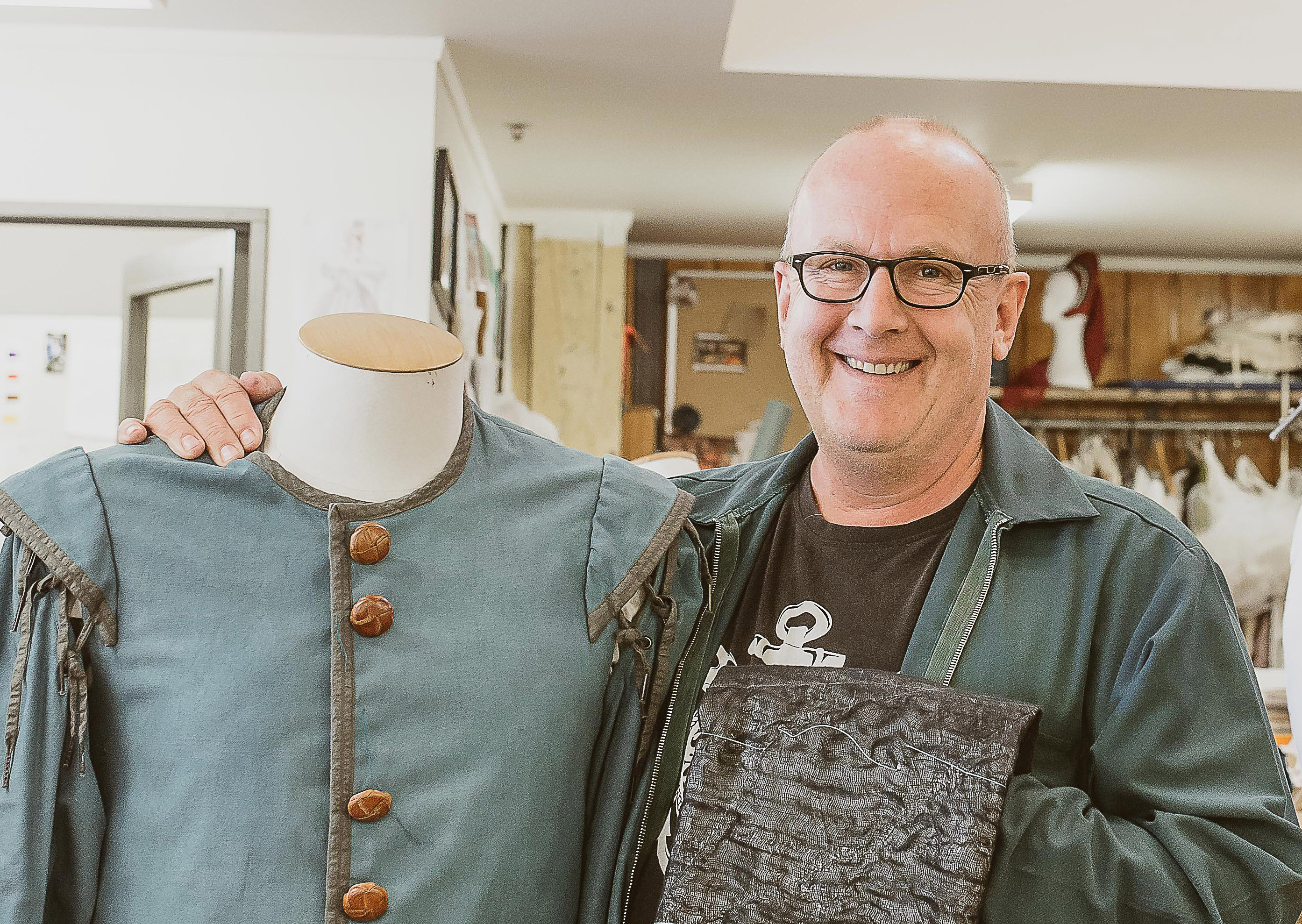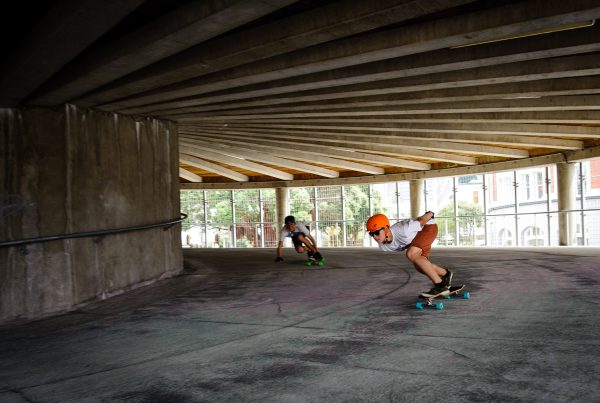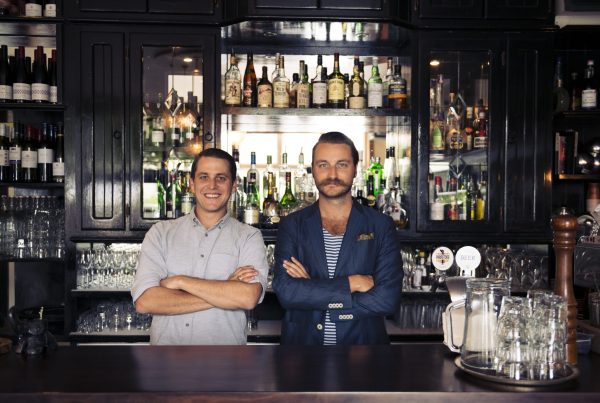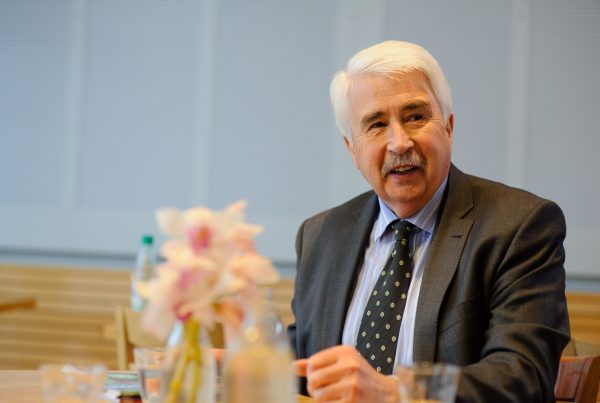
It says a lot about the life of a professional actor, that working in advertising looked stable by comparison.
Hambleton got the work he was hoping for, and stuck it out for a few years. I went back to pretending to repair cars, and leaving an occasional graffito on the walls of Midnight Espresso, by way of being ‘creative’.
That course is the first thing Hambleton brings up when we meet. It’s a glorious Wellington morning in the first days of autumn. Hambleton has a new play to talk about; this magazine has a capacious maw for interviews with committed Wellingtonians. And I couldn’t be happier to have been given the job of sitting and chatting, and then writing up some of the results. Hambleton is, truly, an absolutely delightful bloke. I was dimly aware of this 25 years ago, but we’ve crossed paths a few more times since then, and I’ve always been struck by his seriousness, by his great humour, by his utter commitment to the task at hand.
“It was an interesting time, I guess, in hindsight. I was a happy young actor, and I was getting some interesting roles, and loving the life to a point. But then there’s what I call the dark period, when I didn’t believe — rightly or wrongly — that acting was ever going to be able to pay the bills, the mortgage… and you feel a responsibility to get out there and join the race. I was a postie for a while. I had the South Karori route, and then I picked up some gigs with some of Wellington’s less glamorous ad agencies. I had a rare talent for getting positions under creative directors I didn’t get on with. And, of course, I was miserable. But in that position, with a family, your misery feels like selfishness, and perhaps it is, so you keep at it. But I was lucky, I got some calls from people who wanted to cast me in paying roles, and eventually I made it back.”
It’s an actor’s life, and we talk about that. Hambleton reels off the names of several colleagues, any of whom you could have seen on TV in the last year or to. Each of them has their own stories — often very recent — about working on building sites, in post offices, in call centres. We joke about how easy it is to find a landscape gardener in Wellington between the Hobbits and the Avatars. But there’s no bitterness, or any sense of relief evident. I’d expected him to say “Thank Gawd, that’s not my lot any more” — more about that later — or to express some outrage that professional theatre and film workers should still accept such instability in their lives. But, in the next breath he’s reminding me that it is the same all over the world. London and Los Angeles are no different for the great majority. No sympathy is asked for or expected.
“I went to Naenae College, and theatre was surprisingly strong there. Graeme Tetley [who before he passed away in 2011 was perhaps New Zealand’s greatest screenwriter, with Vigil, Out of The Blue, Mr Wrong and dozens of hours of prime-time television to his name] was teaching English. He was the one who first really got me to read Shakespeare. I mean, I’d read him before, but it was Graeme who lit that particular fire. People like Graeme, and [fellow teachers] Lesley Edgley and Peter Browne, they were inspiring, and they made sure that our school productions were quite incredible.”
There’s a clatter on my recorder here. The FishHead photographer has arrived. I’m struck by how quickly Hambleton transforms into — well, into someone who is utterly used by now to having his photo taken. The chin lifts, the features split into a quite infectious grin. For a few moments our photographer is the centre of his attention. It’s a lovely demonstration of professionalism, and of sheer unfakeable affability. I’m reminded, quite forcefully, that this friendly, blokey, avuncular chap has spent the last few years carrying a starring role in three of the biggest films ever made, and that his face is recognised in pretty much every country in the world. He makes sure that our photographer has everything she needs, and then picks up the thread immediately.
“And it was in the blood. My parents had met during a play they were both doing at teacher’s college. My dad went on to radio, and television. He [Keith Hambleton] became a TV newsreader. So it was always in the house I guess. Dad carried on later, doing theatre, and other bits and pieces on the TV. He passed away five years ago, but for a while there my agent Tim Gordon was very proud of the fact that he had three generations of Hambletons on his books. He had Dad, and my daughter Sophie, and me. So with it in the family, and at school, it made sense to me to follow an acting career too. There were plays at school, and a few things at university, and of course there was a real high point in New Zealand theatre and TV then as well — I could walk down the road and see great actors, people like Grant Tilly and that crew, all strutting their stuff. So that inspired me too, and soon enough I was auditioning for the New Zealand Drama School.”
Hambleton graduated, and launched himself into the world of Wellington theatre and television. “It was the tail end of an era I guess. Downstage could still take you on as kind of apprentice. It was dicey, but if you were lucky you could find a little niche for a while… I had a tiny role in Close to Home, another one in Country GP, I was in something called Adventurer. Me and Marshall Napier were sidekicks to Oliver Tobias. And his main claim to fame was that he’d been in The Stud with Joan Collins… bloody amazing.”

“You know, even before I was cast in The Hobbit, one of the things I noticed about that time was that whatever opinion I expressed… well, I would have been better never saying anything, because everything anyone said was being wilfully misinterpreted by both sides.”
Hambleton — and there can’t be many people who ever trod a board in Wellington who can say this — had never been in a Peter Jackson film before The Hobbit came along.
“When Tim Gordon rang me, I didn’t believe him. I seriously thought he was pulling my leg, or had made a mistake. I mean, I’d been out there and auditioned. It was a fireside scene, with a few lines of dialogue, and I knew I’d auditioned well. And I’d done some motion-capture tests against a green screen. But I assumed that it’d be, I dunno, Bob Hoskins… and us locals would get a few crumbs. It was amazing. And for three weeks, I couldn’t even tell anyone.”
We talk briefly about the Hobbit shoot, but as Hambleton says, there’s only so much you can even begin to describe. A film set is a stupendously busy and invigorating place, full of some of the most interesting and eccentric characters you will meet in a lifetime, but it is also a place of work, and there’s not a lot of fun and glamour in two — nearly three — years of pre-dawn starts, long days and physically demanding roles.
“But at the same time, the experience, the people I’ve met… it’s utterly unique, and irreplaceable, and I feel fantastically lucky to have been there.”
“It’s enriched my life,” he says, “but not in the way that people assume. For a couple of years we were on a very good salary, but there seems to be an expectation from people who don’t know any better that we’re set for life. In reality, I’m probably about where I’d be if I’d had a so-called normal job these last 30 years. It’s let me pay off some of the accumulated debts, but I’m still looking for the next gig.”
Which brings us here, to the foyer of Circa Theatre, and this warm autumn day.
We’d talked about Hambleton’s love of Shakespeare for a while already, and it seems the best of natural progressions that he should be directing a play not by Shakespeare, but about him. Equivocation is a much-feted script by the American Jesuit playwright Bill Cain. Cain has episodes of House of Cards on his CV, which seems a great recommendation for the dark political satire of Equivocation. The play is set against a backdrop of the Gunpowder Plot. Shakespeare has been requested — by the king’s own man — to write a version of the events that will please King James but still be historically accurate.
“It’s extraordinary,” says Hambleton. “It’s in modern language, but Elizabethan costume, which feels right for a play about contemporaries. It’s a play about misinformation, about media management, about WikiLeaks… it’s the most exciting script I’ve seen in years. I stumbled across it a while ago, and I was set to do it in 2011. But the phone rang.”
[info]Equivocation by Bill Cain opens at Circa Theatre on May 24 and is proudly supported by FishHead.
Book now on 04 801 7992
circa.co.nz
[/info]





